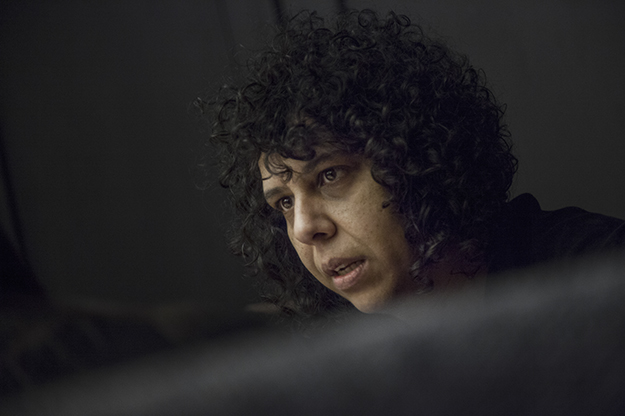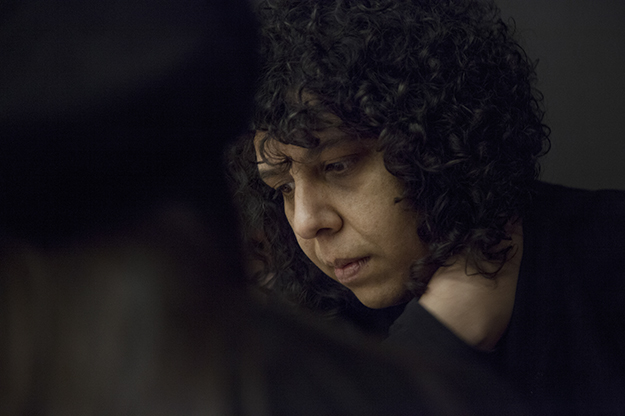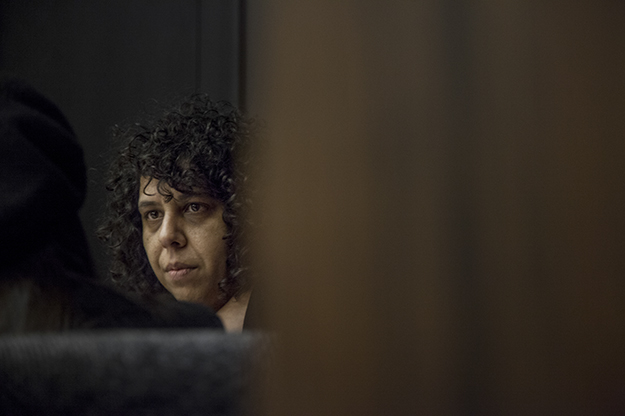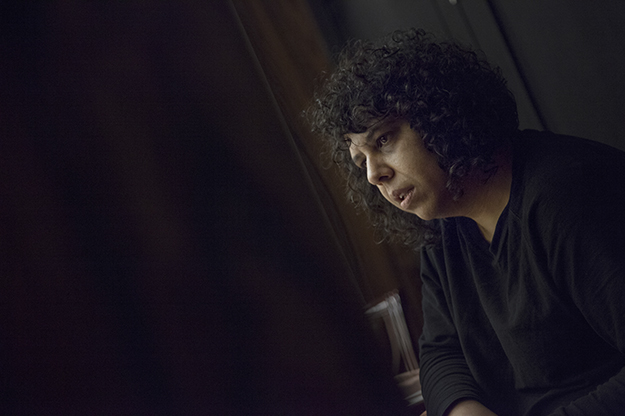For Enisa Eminovska, her self-empowerment was best expressed by her decision to refuse a university scholarship. In 2006, the Macedonian activist learnt she was granted a scholarship from an international foundation while she was studying Business Administration at the South East European University in Tetovo. She didn’t apply for the scholarship or ask for it; it was granted to her on the grounds of her being a Roma student at a private university.
She went to the finance officer and took the contact of the donor, whom she called by phone. “Why did you give me the scholarship? I didn’t ask for it. I don’t need the money,” she told the donor. Eminovska says that the person on the other side of the phone couldn’t understand that someone was calling to refuse a scholarship.
“I was like ‘You don’t get the point that you are disempowering me? I want to earn my own money, and I want to pay for my own education. I don’t want to be educated with a Roma scholarship,’” she remembers telling the official. “That is one of the examples that has shaped my empowerment, and me leading my own empowerment and resistance. But being able to resist this is something that people may not have the opportunities to do.”
Just as she declined the scholarship dedicated to Roma students, Eminovska is determined to not apply for jobs related specifically to the Roma community. Transcending the Roma identity has been crucial for her feeling of empowerment and the choices she has made.
Although she stayed away from organizations working with the Roma communities, she was involved in non-paid independent human rights activism from 1999 to 2011. Going out on her own, she monitored forced evictions by municipal authorities of families residing in slum-like conditions in Macedonia, documenting police brutality.
She stressed concerns faced by Romani and Ashkali refugees from Kosovo, with a focus on survivors of sexual violence of war-time rape. She also provided case management services to individual girls forcibly married below the age of 16, as well as their newborns, by facilitating access to health care and social protection programs.
Although over the years Eminovska used to work with many programs and projects as a gender and social inclusion expert, from 2011 until recently she has been working mainly on women rights, with the International Rescue Committee in Greece, Iraq and Chechnya.
Last week she was in Prishtina participating as a speaker on Roma Women Empowerment at the Regional Roma Summit organized by Civil Rights Defenders. During the Summit, K2.0 sat down with Eminovska to discuss activism, integration vs. assimilation and the empowerment of Roma women.

- Photo: Majlinda Hoxha / K2.0.
K2.0: What makes one a good human rights activist?
Enisa Eminovska: I think first there has to be a lot of passion for justice, and that passion is the biggest driving force to one being an activist. But that is also a risk, especially if individual and independent activists do not have support. They may burn out. Passion unattended burns to its own destruction.
My activism was completely free of projects, completely free of a paid salary and free of organizations. I was collaborating with many organizations, I was sitting with them at different forums and discussing various issues with them, and working with them together towards developing a vision. But not as part of the institution, not as part of an organization, and not as part of any projects.
It was a very conscious decision. I wanted to make sure that what I say and how I speak about things is not influenced by anything and anyone else, other than my perception and the story of people that I was interacting with, the communities.
Would you call your activism much more of a grassroots activism?
It was very grassroots, but also independent activism, which I was able to do. And I say ‘which I was able to do’ because at the same time I had to earn money. But I was earning money as a professional, not as an activist.
Your tone sounds quite critical toward civil society and human rights organizations in the region.
I don’t know about them right now. Since 2011 I left that completely. So since then, I don’t observe, I don’t follow day-to-day events. I am having more general, more sequenced observations. I don’t know who the people are now, and who the NGOs are now. But back in that time, yes I was very critical, and I hear and see some of the same things. I don’t feel like I missed much.
What are the same things you hear and see that haven’t changed, and that you are critical of?
What I am constantly critical of is hearing everyone saying that things are not changing and the results are not satisfactory, and everyone realizing that the role of the community has to change and has to become a lot more proactive, but nobody actually doing the kind of work to create the space in which communities can lead the vision for development. Even this whole concept of integration… I am now at the point where I am questioning the whole concept.
As one of the participants today said, “If you want to integrate, you have to assimilate.” It is the harshest reality that I have ever heard, but it is true. So [regarding] the whole idea of integration, I think we have to open this discussion with the communities, with mahallas [neighborhoods] and settlements, and ask them what they think about the integration they have been seeing for over a decade now. Do they still want to continue in that way? Or do they have other ideas about how their lives can look and be of better quality?

- Photo: Majlinda Hoxha / K2.0.
What is your take on integration?
I don’t think we should talk about integration anymore. That’s what I am saying. Because integration [comes with] a very clear expectation or it has [been] proven in the past that we have to change — and that change, the integration for the Roma, came at the price of assimilation.
In Macedonia, some of the trends that we have been observing over the years [are that] the more years of formal education people get and the higher they climb up the ladder of academia, the more detached and distanced they become from the Roma community. It [goes] both ways; it is a mutual relationship. The community doesn’t feel them as one of their own anymore, but also those people change the ways in which they associate or not with that community.
A lot of it has to do with how much oppression they have internalized on the way, because of their own capacities to resist, individual capacities, which are very much needed. It is not easy to resist what comes on your way.
You said you don’t want to earn money or have a salary from being employed at a Roma rights organization.
It is not only about the money, but also my relationships with my Roma identity has been politicized and influenced by the trends, policies and conversations in those years [when Roma-focused NGOs began to emerge and be supported].
But the money aspect… it was very clear to me because of having my mind open and my mouth free to talk about issues in the way they are, it was not not going to be informed by what the donor wants to hear, or whoever who hired me to write a report.
I don’t want to earn money as a Roma. I don’t want to charge for my services, for my activism. I want to earn my money elsewhere, not work for a Roma organization. That is what empowerment and integration meant to me — when I was able to define it for myself how I see my own path; [it] is when I am competitive with my peers globally, not competitive with the Roma community based on that identity that I am Roma. I am so much more than a Roma. Part of me is Roma, but I am so much bigger than just being a Roma.
There is no such thing as a Roma expert. You can be an expert on social inclusion. You can be an expert in development, in human rights or whatever. But you can not be an expert in Roma; you can not be an expert in Albanians, in Macedonians.
Earning money as a Roma and professionalizing your identity as a Roma has messed with my own relationship with Roma for a very long time. I constantly needed to find ways to preserve my relationship with the community, because at some point it became very political. It became an opportunity to build a career, to earn money and I didn’t want it. I made a choice [that] I didn’t want it.
Integration to me means [that] I am competitive, and I am an expert in a thematic area. Not an expert in people. I don’t want to be a Roma expert. There is no such thing as a Roma expert. You can be an expert on social inclusion. You can be an expert in development, in human rights or whatever. But you can not be an expert in Roma; you can not be an expert in Albanians, in Macedonians.
I have been called that. I am sure if you Google me it will come up somewhere, as a Roma expert. But these are the names and titles we were given by others, without having a possibility to reflect and be like, “wait what is this now?” Some people over the years have tried to bring this to attention, [that] you are going in the wrong direction.
These are all the indicators of us moving in the wrong direction — with the whole vision and idea of how we, how the Roma community should be integrated into mainstream society. I have made my choices and I decided to not be limited to being a professional Roma 24/7, to go to conferences and meetings only because I am Roma. To have the microphone, to have the privileges to apply for Roma jobs, the space is very small. It is not integration.
At the Summit, you spoke about internalized anti-gypsyism. Does internalized anti-gypsyism drive a Roma person to be willing to largely assimilate him or herself into the larger community? How would you define internalized anti-gypsyism?
[As all other] internalized racism, internalized oppression. We have all lived with it. We as women have internalized oppression, we as Roma are internalizing oppression. We are internalizing oppression on so many levels every day. It is when you start to believe and also behave in accordance with the image of you created by others — by society, by community, by family, by you name it.
I have seen, and I continue to see and to witness internalized anti-gypsyism in Roma communities in my regular daily circles, in my hometown, among my family members, and especially among the young generation.
Our parents’ generations had their own ways of how internalized oppression has come to the fore. Now we as a generation, and generations coming after us, have different ways, but it is still there. I can see it is very much alive and that scares me more than the anti-gypsyism coming from the institutions. It is a different enemy.
I believe that we have to liberate ourselves from the oppression first, and we have to heal from that trauma. It is not going be easy to unpack all of that especially because we don’t have a documented history.
Documented history by whom?
We don’t trust the sources, and that leaves us with so many questions about our own past, and we have to come to an acceptance that maybe we won’t have all the answers or maybe we will never be happy with what others wrote about us.

- Photo: Majlinda Hoxha / K2.0.
Undocumented history since the time when today’s Roma people left India?
Not even that far [back] in history. In Macedonia, I remember I was struggling this past summer, and over the past few years as well, to collect information on if and how many Roma were deported to concentration camps.
Did we have such a thing in Macedonia or not? Can someone confirm with certainty? We know there were concentration camps in Serbia, Croatia, on the border of Croatia and Bosnia. But what is the story of Macedonia? What is the life experience of the Roma there?
We continue to not say much about ourselves. It’s one of the biggest challenges that we have to face if we are going to ever have a sincere conversation with our own communities. We have to open up and we have to show who we are to others.
That has to go along with [an end to] self-segregation as one of the survival strategies, or coping mechanisms, used by communities over time in different contexts — [the idea that] by staying on the outskirts, by being on the margins, by being invisible you are gonna avoid getting into trouble.
We have to redefine that social agreement with our societies, but we are not here to be on the outskirts. I am not a guest in my own country. I am part of this society, and this society has to transform and redefine standards which include me, which count my opinions as well.
You say that Roma individuals reinforce their marginalization by staying on the margins. But what about the role of institutions. Do you see any progress and willingness in institutional efforts to get Roma citizens out of the outskirts?
I think there was a time when there was a willingness and readiness, but I feel something, somewhere went really wrong. I think governments showed readiness to work on the issue, but again that trend of the Roma issue being on the political agenda did not come from the communities. It came from the donors, it came from civil society, which has very little connection to the grassroot communities, and has stayed disconnected over the years of their work.
They are not attached to communities. They are not the ultimate representatives of the communities, especially if communities are not included in any conversations about designing the projects, and designing any vision.
In that way, it became a trend in the region… so governments did show willingness and readiness. But I think at the time, the way we were envisioning integration and the way it turned out to be implemented and then replicated throughout the region as a model is not what we thought, or what we wanted to see.
The way integration projects and policies were implemented throughout the ‘Decade of Roma Inclusion,’ and then the whole period around that, has not transformed the system. It is creating small segregated units within the public and institutions who work with and receive the Roma clients who come to ask for a particular service.
It is also the case with the Roma health mediators. They did not accomplish the vision to transform the system from within, so that the system would be ready for both Roma and non Roma staff to receive Roma patients.
Why do we need these small units of Roma created within institutions, who only deal with the Roma issue? That was not what we had in mind.
What turned out to be, at least in Macedonia, is that whenever a Roma shows up in a particular institution, he or she is asked to go to talk to the Roma health mediator, if there is one. So the Roma mediators are only there to work with Roma patients, and they only provide services to Roma. We did not envision integration in that way. We did not want that.
The same with education. The government is giving public money to scholarships for Roma university and high school students. They participate together with the Roma Education Fund. But the unit which actually implements this scholarship scheme is the unit of Roma staff only, in one office, which is not the scholarship department for all other students in Macedonia. [The unit] is within a center for advancement of the languages of the minorities — totally different department! They are segregated within the institutions.
The same is true within the Ministry of Labour and Social Policy. They have the department for the implementation of strategy for Roma in Macedonia. Why do we need these small units of Roma created within institutions, who only deal with the Roma issue? That was not what we had in mind.
The quota thing can be discussed in different ways. One way is that it increases the number of Roma attending higher education, that for many would be a far-fetched thing as a result of a poor socio-economic background.
My opinion about the quota is that they can only serve as a temporary measure to catch up. If you let them endlessly be there, you have no indicators of measuring success. I don’t want to see these quotas and reserved seats 10 years from now. But I am already seeing them for almost 20 [years]. So equality is not going to happen, because it is going to be limited to a number of Roma who can get involved in schools, at universities, and get few jobs at public administration. But that’s all. There is a limit to it.
You were invited to the Roma Summit to talk about empowerment for Roma women. It is an issue that has been frequently raised in the region over the years, as minority rights were brought to attention after the creation of new states emerging from the break-up of the former Yugoslavia. What meaning does women’s empowerment have for you?
Roma women’s empowerment has meant so many things over the years. We have seen projects where empowerment meant a vision to see Roma women capable of standing up for their own rights, submitting complaints and using the mechanisms and legal instruments in the countries.
To many it meant economic empowerment and the independence of women to earn money. So there were projects around micro-financing small businesses or trainings around startups of small businesses. To others it has meant political participation of Roma women, of wanting to see women at elections for mayors and members of municipal councils. So it has had different meanings.
And today?
Today, I don’t know where we are. I don’t hear much about how Roma women’s organizations work, and I am not hearing much about new groups and youth showing up and having something to say. The spaces are pretty much limited for Roma women nowadays. I think there are not many programs and not many donors who support Roma women’s work in the region recently. That is my impression.
You think that human rights activists aren’t committed to Roma women rights?
Not just activists, organizations as well — Roma and non-Roma organizations that are committed to human rights and social justice and that work with Roma communities. They also make choices on which issues they speak about and which issues they don’t. When it comes to Roma women, and to an extent children as well, they are hesitant to talk about some of the forms of violence against women and children in the communities that we need to address.
We need to hold governments accountable and protect the rights of women and children inside of the community. So you have that avoidance of the issue over the years. It has been there for a long time, and I still see it.

- Photo Majlinda Hoxha / K2.0.
Early marriages remain a concerning obstacle for many Roma young women to enjoy many of their rights, at least in Kosovo. I have the impression that society largely looks at it as a cultural and traditional aspect of the Roma community. But the institutions do the same thing, and by looking at it as a cultural phenomenon, justify their inaction on the matter. There were times that even Roma activists themselves would comment on the issue as something that belongs strictly to the community…
That is the internalized racism I am talking about. We believe what others say about us, because we don’t have the knowledge and we don’t know how to talk about these things. Early marriages and child marriages is not something that has originated from Roma.
People in this region have very short memory but it used to be a practice across the Balkans not long ago, not even a whole century ago, half a century ago. It is really funny but the reality is that it is not a cultural Roma [matter], but it is a consequence of patriarchy. There is no other way to talk about it.
Does the patriarchy within the Roma community need to be tackled much more strictly?
Not only within the communities, but within the institutions as well. [Just] because it doesn’t happen with the majority of the population in the country, it doesn’t mean they [institutions] shouldn’t have the knowledge, or the direction in which we want them to be seen to apply the law: to protect the rights of women and children.
You were involved in many organizations, even in Greece, Chechnya, and Iraq working on women issues. Do you see similar patterns affecting the deep inequality?
Everywhere, it just has different ways of how it is manifested at given points of time, or at least while I am there, at that particular context and that particular point of time in that country. But it really comes down to the basic logic of unequal power relations of how male members of the society are using and abusing their privileges.
In the region, it became a trend to talk about an inclusive and non-discriminatory society. But do we need to talk about racism as well, which has been missing from the public and media debate?
Constantly. At all times. Everyone should have a conversation with themselves once in awhile. Somebody today was saying if we ever feel we have the power to discriminate against the other? We do have the power. But how we relate to the power when we get it is not very different.
My impression is that, for example in Macedonia, to an extent Roma see themselves as superior to the Egyptians. They feel stronger because they are more in numbers and more visible in politics and have pushed through some of the ceilings more than the others.
The same thing happened with the Albanians. They were trying to explain to the others, to the majority, how important it is to break down that monopoly of how things work in the country — ‘not just one culture, not just one nation, there are so many others around.’ But once they got in touch with the power they started behaving like the majority.
The moment Roma feel bigger than others, they also join that other side and also within the community. How they treat LGBT people, women at times. So it is really about power abuse and unequal dynamics of power.K
This interview was conducted in English. It has been edited for length and clarity.
Feature image: Majlinda Hoxha / K2.0.





